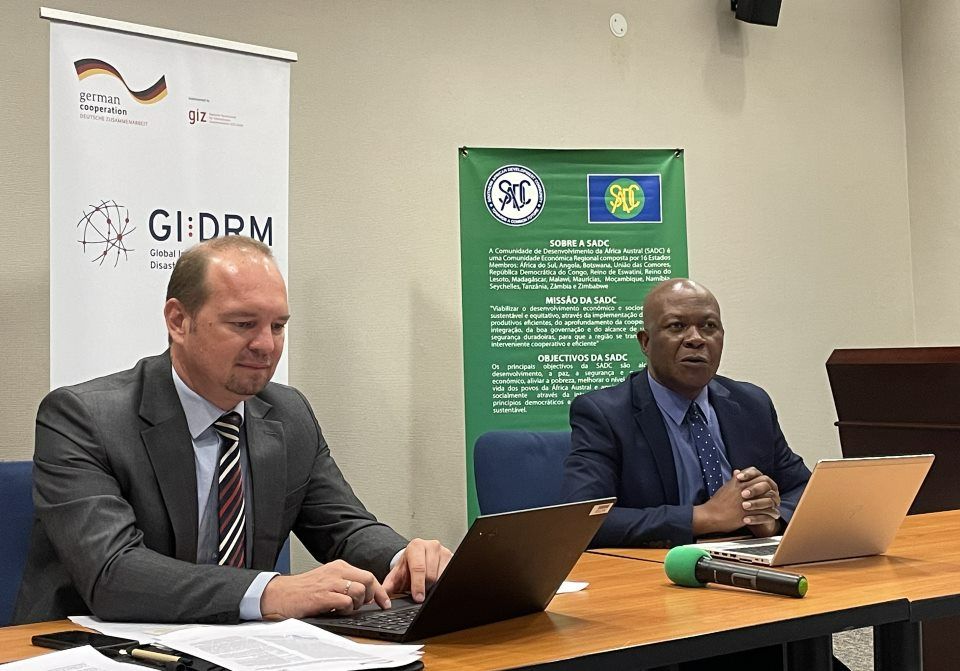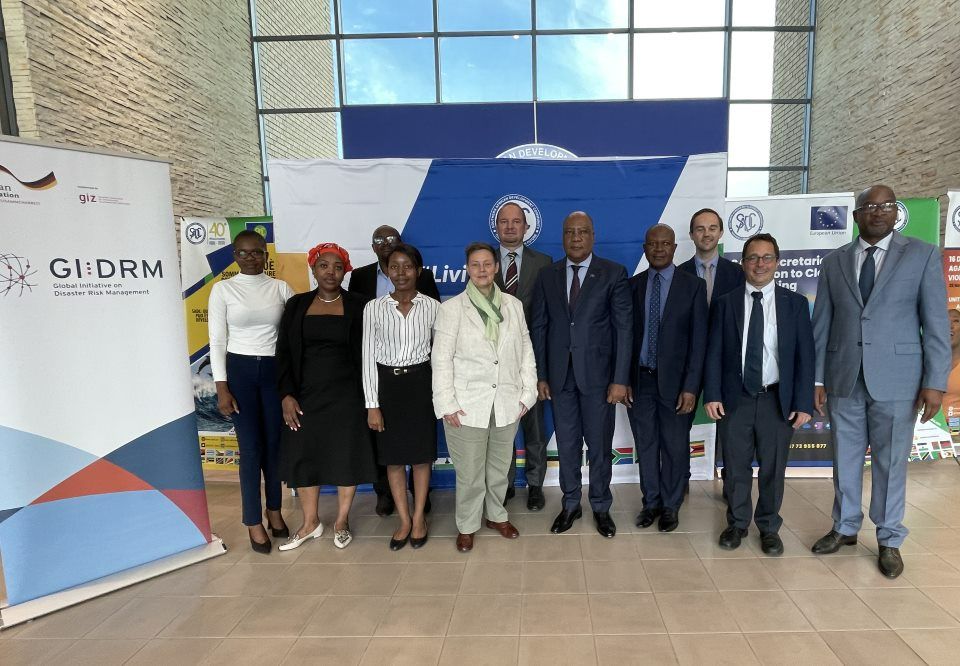Second Project Steering Committee Meeting of GIDRM and the SADC DRR Unit

The 2nd Project Steering Committee Meeting of Global Initiative on Disaster Risk Management (GIDRM) and the SADC Disaster Risk Reduction (DRR) Unit took place on the 29th of March 2023 in Gaborone, Botswana. In their opening remarks, Mr. Domingos Gove representing DES-RI and Mr. Daniel Bagwitz, country director of GIZ-Botswana/SADC, both highlighted the importance of collaboration and the critical role of GIZ/GIDRM in advancing the regional development agenda encapsulated in the Regional Strategic Indicative Development Plan (RISDP 2020-2030).

© GIZ
The committee took stock of the ongoing risk-informed development-based processes which are being integrated into sectors, namely the water/agriculture and urban sectors at the SADC national or subnational levels through complementary GIZ projects. Decisions related to the water/agriculture sector included:
- urging the Secretariat to nominate members of the committee to attend the ORASECOM regional engagement workshop on risk-informed development (RID) planned to be held in May/June 2023;
- and encouraging the GIDRM and SADC DRR Technical Working Group to upscale the Lesotho experience of the Public Infrastructure Vulnerability Assessment Committee (PIEVC) Protocol in the region and/or water commissions.
Related to the urban sector, the committee supported the kick-off event on the “Learning Process on Flood Management for Risk-Informed Urban Development”, urging the GIDRM and the working group to align this process with the anticipated SADC Urban Resilience Agenda.
Based on the piloting of the PIEVC Protocol in Lesotho, specifically, on the Metolong Dam System, it was further underscored that the core dimensions for an “Enabling Environment for risk-informed development” should be considered, i.e.,policy and regulations, finances and resources, knowledge and information, partnerships and collaboration, people and culture, as well as institutional organizational arrangements. Accordingly, the committee reaffirmed that a paradigm shift is necessary to address risk with its cascading potentials as opposed to dealing with disasters as unavoidable events and as part of development planning and practices.

© GIZ
In March 2023, the SADC DES-RI issued a letter to the DRR focal points from the SADC Member States to generate support for the implementation of the following activities in cooperation with GIDRM, and which were tabled to the committee as follows:
- Understanding Systemic and Cascading Risks: Learnings From COVID-19 (CARICO) in the SADC region to identify, document, and analyze cascading and systemic impacts and risks linked to the COVID-19 pandemic in two selected pilot countries and produce recommendations to inform the development of a COVID-19 recovery plan for the SADC region
- Development of a roadmap for the INFORM Subnational Risk model for the SADC Region to ensure that shared risk analysis are used through a regional standardized comparative base map across development sectors. The roadmap is a milestone for securing developmental gains in the SADC region.
- Development of the “Disaster Risk Management Value Chain Mapping Study for the SADC region to identify bottlenecks in current practice.
- Assessment of the SADC Secretariat’s Disaster Risk Coordination Mechanism to assess the level of inclusion of gender and RID and develop recommendations for mainstreaming RID and gender equity principles into its regional instruments and decision-making processes.
- Reporting on the reviewed DRM strategies and instruments including the following: a) SADC Gender Mainstreaming Resource Kit, b) Revised Biodiversity Strategy and Action Plan (2022-2032), c) Southern African Development Community (SADC) Drought Strategy 2022- 2032, d) SADC Disaster Risk Management Strategy and Action Plan 2022-2030, e) Regional Multi-Hazard Planning Framework 2022-2030, and the f) Tourism Crisis Communication and Disaster Management Strategy.
- Development of the “Standardized DRM Assessment Tools (SDRMAT)” to facilitate standardized context-specific assessments in the SADC region and ensure timely and responsive actions in the face of extreme events.
- Development of a National-Regional Alignment Toolkit applicable to the SADC Resilience Framework 2020 – 2030 to be used by member states to measure, track, and facilitate the alignment to their respective national resilience and/or development strategies.
- GIZ’s financing agreement for a temporary position of a SADC Senior Programme Officer to support the DRR Unit in promoting the inclusion of risk-informed based approaches.
- Support to the SADC DRR Unit to convene a meeting of the Ministers responsible DRM in DRC in May 2023 for the “Intergovernmental Memorandum of Agreement (MoA) amongst the SADC Member States for the establishment of a SADC Humanitarian and Emergency Operations Centre (SHOC)”. The signature of the MoA as well as GIZ’s support towards the development of the “Sustainability Plan and Business Continuity Model for SADC’s SHOC” will become a milestone towards the African multi-hazard early warning and early action system programme (AMHEWAS).

© GIZ
In light of the current project phase ending in October 2023, discussions are underway for the next phase (GIDRM IV) to foster the integration of risk-informed development processes into relevant sectors through other German technical cooperation projects.
The next committee meeting will be held within the last two weeks of September 2023.
Further links: